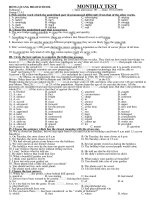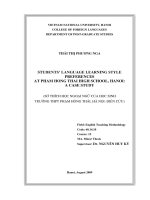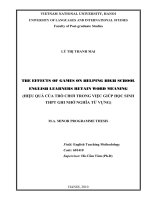HONG QUANG HIGH SCHOOL ENGLISH EXAM
Bạn đang xem bản rút gọn của tài liệu. Xem và tải ngay bản đầy đủ của tài liệu tại đây (61.46 KB, 4 trang )
HONG QUANG UPPER SECONDARY SCHOOL ENGLISH EXAM ( N0: 1 )
Fullname: ( Time allowance: 90’ – Date: 16/01/2010)
I. Pick out the word which the underlined part id pronounced differently from that of the other words.
1. A. compromise B. arthritis C. Christ D. minibus
2. A. pleasure B. sound C. sane D. best
3. A. lemur B. leez C. legality D. lead
4. A. new B. few C. threw D. knew
5. A. looked B. moved C. achieved D. learned
II. Choose the underlined part that is incorrect.
6. The instructor advised the students for the procedures to follow in writing the term paper.
A B C D
7. Mrs. Steven, along with her cousins from New Mexico, are planning to attend the festivities.
A B C D
8. While push-ups build your arms, shoulders and chest, sit-ups they strengthen your abdominal muscles.
A B C D
9. Salmon lay their eggs and die in fresh water, although they live in salt water when most of their adult lives.
A B C D
10. Since it was so difficult for American Indians to negotiate a peace treaty or declare war in their native language,
A B C
they used a universal understood form of sign language.
D
III. Circle the best options to complete the following passage.
THE MOTORING BOOM IN THE U.S
The 1920s saw the emergence of widespread car ownership in the U.S. Assembly-line production
made car wonderful cheap, credit was available on the cheapest(11) and irresistible(12)…………… …………………
of the car to the consumer did the test. The result was a complete(13) .of American life.…………
The car began to break(14) the ancient sharp division between town and country. The movement perhaps ………
began with the prosperous middle class(15) for a holiday from New York, who were delighted to discover …………
the rest of the country. But the cheap car also enabled the working class to travel, for pleasure or in(16)………………
of work. Even poor country people, it(17) .out, could own cars and when they did so, many of them used ……………
the freedom thus(18) to depart-to the west or to the cities.……………
Even more important, perhaps, was the(19) of the car on daily life. It came into(20) for all sorts …………… …………
of short(21) , to work or to the shops, which had previously been made by trolley bus or railway. It made ………………
a whole new pattern of living possible. Vast suburbs began to(22) over the land. No longer did you have to ……………
live in comparatively cramped(23) .near the railway station. Nor did you have to(24) your annual ………… …………
holiday ay one of the traditional, crowded resorts nearby. Instead, you could(25) over the hills and far ……………
away.
11. A. obligations B. terms C. guarantees D. repayments
12. A. appeal B. outlook C. impression D. fancy
13. A. transfer B. variation C. revision D. transformation
14. A. down B. off C. in D away
15. A. concerned B. willing C. anxious D. fond
16. A. hunt B. search C. chase D. inquiry
17. A. found B. turned C. brought D. set
18. A. gained B. gathered C. reached D. benefited
19. A. gained B. product C. impact D. trace
20. A. advantage B. use C. worth D. function
21. A. travel B. trips C. tours D. routes
22. A. spread B. wine C. scatter D. broadcast
23. A. housing B. residence C. surrounding D. settlement
24. A. make B. place C. take D. that
25. A. press B. speed C. stir D. pace
IV. Choose the sentence which has the closest meaning with the given one.
26. After the very salty food we had, we were all dying of thirst.
A. We all died because we were too thirsty B. We were very thirsty after having the very salt food
C. The food was nor salty enough for us to have D. We all died because there was not enough food
27. If I had known about it, I would have visited her in hospital.
A. I visited her in hospital because I knew she was ill B. I didn’t know about it, so I didn’t visit her in hospital
C. I didn’t have time, so I didn’t visit her D. I didn’t know about it, but I visited her
28. Should he refuse you, come and see me.
A. If he ever refuses you, come and see me B. He shouldn’t refuse you
C. Refuse and come to see me D. If you come and see me, you shouldn’t refuse him
29. Never has he been such a nuisance.
A. He has never been a nuisance B. It is the first time he’s got into trouble
C. he has never had any difficulty D. It is the first time he has been a nuisance
30. John was earning much less in his previous job than he is now.
A. John is earning less in his current job B. John is earning more in his current job
C. John had a higher salary in his previous job D. John’s previous job brought him as much money as
his current one
V. Choose the best answer.
31. Is the doctor here? I don’t know. Did you the receptionist?……………
A. tell B. find C. check with D. look
32. I want to find a new job. I’m going to the office to fill out the forms.…………
A. newspaper B. employment C. advertising D. post
33. “ Could I speak to Susie May, please?” “ ”……………
A. Talking B. Speaking C. Calling D. Answering
34. “ Is David in?” “No, he’s out. Would you like to leave a .?………………
A. message B. letter C. telephone D. call
VI. Read the passage then choose the best answer to question below.
A. Compact discs(CDs) have revolutionized the music industry with their surprisingly realistic sound. The six inch
discs look like than plastic sandwiches with aluminum in the center. They have digitally recorded material that is read
by laser beams, so the sound has none of the cracking of vinyl records. CDs are also virtually indestructible, and they
are lighter and smaller than conventional records(LPs). Since their introduction, CDs have become more affordable
and widely available. In fact, they are now sold in electronics and video stores that they haven’t formally carried
records or cassettes.
There has been a phenomenal growth in the sale of CDs. Sales climbed dramatically during the second half of
the 1980s. In the 1990s, sales have been even greater. CDs have all put replaced LPs in stores and, in spite of their
being less affordable than cassettes, continue to gain in popularity.
56. The main appeal of CDs is their …………
A. price B. size C. sound D. available
57. The word “revolutionized” could be replaced by ………………
A. changed B. fought C. surprised D. market
58. The word “ virtually” is most similar to which of the following?
A. completely B. rarely C. almost D. somewhat
59. The author refers to CDs as “ sandwiches” because they………………
A. are light B. are small C. are layered D. don’t crackle
60. This passage states that it is difficult to …………
A. play a CD B. produce a CD C. record a CD D. destroy a CD
61. The word “widely” is closest in meaning to which of the following?
A. truthfully B. broadly C. worldly D. suddenly
62. The word “ carried” is most similar to which of the following?
A. declared B. comprised C. attached D. offered
63. The author uses the word “ phenomenal” to indicate that the growth is .…………
A. remarkable B. pessimistic C. impeccable D. groundless
64. According of the passage, which one of the following is true?
A. New kinds of stores are selling CDs B. CDs are as available as cassettes
C. Stores are selling more CDs than cassettes D. Stores are losing money on their cassettes
65. The author main purpose is to ……………
A. A. tell how CDs are made B. discuss the growth of CDs
C. compare CD to sandwiches D. descried the stores that sell CDs
B. The Norwegian is doing its best to keep the growth of the soil industry under control. A new law limits
exploration to an area south of the southern end of the long coastline; production limits have been laid down( though
these have already been raised); and oil companies have been allowed to employed more than a limited number of
foreign workers. But the oil industry has away of getting over such problems, and few people believe that the
Government will be able to hold things back for long. As one Norwegian politician said last week: “ We will soon be
changed beyond all recognition.”
Ever since the war, the Government has been carrying out a programme of development in the area north of the
Artic Circle. During the past few years this programme has had a great deal of success. Tromso has been built up into
a local capital with a university, a large hospital and a healthy industry. But the oil industry has already started to draw
people south, and within a few years the whole northern policy could be in ruins.
The effects of the development of the oil industry would not be limited to the north, however. With nearly
percent employment, everyone can see a situation developing in which the service industries and the tourist industry
will lose most of their workers to the oil industry. Some smaller industries might even disappear altogether when it
becomes cheaper to buy goods from abroad.
The real argument over oil is its threat to the Norwegian way of life. Farmers and fisherman do not make up
the majority of the population but they are an important part of it because Norwegians see in them many of the
qualities that they regard with pride as essentially Norwegian. And it is the farmers and the fishermen who are most
critical of the oil industry because of the damage that it might cause to the countryside and to the sea.
66. The Norwegian Government would prefer the oil industry to
A. slow down its rate of development B. provided more jobs for Norwegians
C. look for oil on the southern coast D. develop more quickly than at present
67. What has the Norwegian Government’s policy been for the area north of the Artic Circle since the war?
A. To prevent a growth in population B. To improve facilities in the area
C. To develop a large tourist industry D. To discourage industrial development
68. What might can be the effect of the oil industry on northern Norway?
A. The development of industry B. A growth in population
C. The failure of the development program D. The development of new towns
69. In Norway, one effect of the development of the oil industry might be………
A. a large reduction in unemployment B. an increase in unemployment in the north
C. a reduction in the number of existing industries D. the development of a number of service industries
70. Why are Norwegian farmers and fishermen important?
A. The economy depends on agriculture and fishing B. They form the majority of the population
C. they are thought of as the real Norwegians D. They are responsible for preventing pollution
VII. Pick out the word which has the stress pattern different from that of the other words.
71. A. squander B. thunderous C. uncertainty D. balance
72. A. ferocious B. customary C. assort D. ignite
73. A. device B. declare C. gullible D. mature
74. A. pensioner B. revenge C. conscious D. union
75. A. stringent B. urology C. testimony D. terrorist
VIII. Read the set of words given, and then choose the best sentence that is the best made.
76. in 1945/Ho Chi Minh/formation/of//the/announced/democratic/of/republic/Vietnam/the.
A. In 1945, Ho Chi Minh announced the formation of the Democratic Republic of Vietnam
B. In 1945, Ho Chi Minh announced of the formation the Democratic Republic of Vietnam
C. In 1945, Ho Chi Minh announced of the formation of the Democratic Republic of Vietnam
D. In 1945, Ho Chi Minh announced of the Democratic Republic of Vietnam formation
77. he/it/believed/him/that/would/prepare/the/forthcoming/for/against/the/struggle/the/French.
A. He believed it that would help prepare him for the struggle against the French forthcoming
B. He believed that it would help him prepare for the struggle against the French forthcoming
C. He believed that it would help him prepare for the forthcoming struggle against the French
D. He believed that it would help prepare him for the struggle against the French forthcoming
78. would/farm/bought/the/as/tractors/more/such/machines/have.
A. The tractors would have bought more such as farm machines
B. The farm would have bought more machines such as tractors
C. The farm would have bought more machines such as bought tractors
D. The farm would have bought more machines such as more tractors
79 had/the/we/car/the/of/to/by/spend/night/in/side/the/road/the.
A. We spend the night in the had car by to the side of the road
B. We had to spend the night of the car in the road by the side
C. We had to spend the night in the car by the side of the road
D. We had to spend the night in the car by the road of the side
80. was/the/that/rain/the/so/roads/the/in/all/it/city/hard/flooded.
A. The rain was so hard that it flooded all the roads in the city
B. The rain was hard that so it flooded all the city in the roads
C. The rain was so hard that it flooded all the city in the roads
D. The rain was hard so that it flooded all the roads in the city
-THE END-
TRY YOUR BEST AND GOOD LUCK TO YOU!









